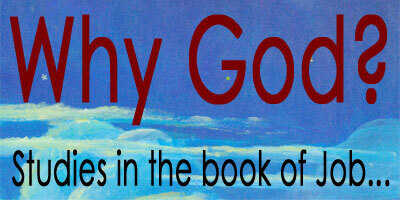
432.4K
Downloads
3359
Episodes
G’day and welcome to Partakers Christian Podcasts! Join us for uplifting Bible teaching, inspiring readings, heartfelt worship, powerful prayers, and fascinating church history. Whether you’re new to faith or growing deeper in your journey, we’re here to encourage and equip you. 🎧 Tune in, interact, and be inspired—wherever you are in the world.
G’day and welcome to Partakers Christian Podcasts! Join us for uplifting Bible teaching, inspiring readings, heartfelt worship, powerful prayers, and fascinating church history. Whether you’re new to faith or growing deeper in your journey, we’re here to encourage and equip you. 🎧 Tune in, interact, and be inspired—wherever you are in the world.
Episodes

Thursday Jan 18, 2024
Job - Why God? - Part 1
Thursday Jan 18, 2024
Thursday Jan 18, 2024

Study 1 : Job 1 - 2
Terrible disasters hit Job. The book of Job is totally fascinating – but difficult. It is deeply concerned with the question of wisdom – how does one live well – but we will leave consideration of that to later in our studies when the question rises to the surface.
In particular the book deals with the questions that arise when disaster strikes. There are no clear answers to the questions it poses. Instead there are lengthy dialogues between Job and his three friends, then between him and a rather brash young fellow and only finally with God. We are left to think and puzzle over what is said and draw our own conclusions rather than treating it as an authoritative text that tells us things we should believe or do. One commentator says “we need to be transparent about the hazards of being human and teach the full witness of Scripture, which is messy, complex and, ultimately, wonderfully true.” That is nowhere more the case than in the book of Job. This is an attempt to teach that full witness as we are given it in this book.
Job Chapter 1
What a situation! Before looking at it in any detail here is an overview of what is to come.
The book tackles two major questions in particular:
Question 1: why is it not true that good things happen to good people and bad things happen to bad people. A Psalmist realised that when he said “For I envied the arrogant when I saw the prosperity of the wicked. They have no struggles; their bodies are healthy and strong. They are free from common human burdens; they are not plagued by human ills. This is what the wicked are like – always free of care, they go on amassing wealth. Surely in vain I have kept my heart pure and have washed my hands in innocence”
Then the major question 2) is: how can it be that our world, and our life in it, is subject to so much chaos.
It also raises two other questions that follow from those two: 3) how can we live wisely in this difficult environment and 4) how can we trust in the reliability of God if he presides over such an erratic world.
We will not get complete and totally satisfactory answers to those questions but we will be forced to think through our attitudes towards them and come to a deeper appreciation of this world we live in and the God who created and now controls it.
Question 1 revolves round one false idea that was common in those days and is still very common today. That is that everything that happens to us has a moral cause behind it leading to the effect we see. We will call this a CEP – cause/effect principle. It suggests that if I am good only good things will happen to me; if I am bad then bad things will happen to me. That leads to commonly heard statements like “he didn’t deserve that”, implying that something terrible has happened to an essentially good person and that it shouldn’t have done. The CEP does, of course, operate in the physical world: if you put salt in water you get salt water; if you kick the table leg you will get a bruised toe. The book of Job teaches us that a principle like that does not operate in the moral and ethical world.
Question 2 revolves around what we will call the NCL – normal chaos of life. Many Christians would query use of the word chaos in relation to the way the world works but it does seem to be the right word to use in this book. We will question the use of it more closely in study 9. As we shall see the book of Job teaches us that life is not well ordered. It hasn’t been since the Creation. However difficult it may be to accept that God did not create a neat and well ordered world but one that appears to us to be a thoroughly erratic one that is what he did and we have to live in it.
To move on to the detail of chapter 1, here it is.
Job was probably a real person who gave rise to many stories. He lived in the Middle East, but not in Israel, sometime about the same time as Abraham. The book was written by an Israelite much later, probably about 700 BC possibly using an old beginning and the end as a frame into which he put the lengthy poetical dialogue which is the main part of the book. The obvious intention was to do something to answer some of the questions raised by the old tale. We will look at selected sections of the book, not all of it, which can be thought a bit repetitive.
The Satan of this chapter is not the devil of later books of the Bible. He is a member of the Angelic Council (1: 6). He is the Accuser, the prosecuting counsel before the Lord, a sort of Attorney-General so we are straight into a courtroom type of thinking. We shall soon find that much of the book is concerned with Job wanting a judicial review of his case. He wants to be able to argue his case before the Lord.
Chapter 2
The challenge and counter-challenge between the Lord and the Satan in these first 2 chapters are curious to our eyes. The point in that culture is that if Job does not love God for his own sake, but for what he can get out of it, the honour of God is severely damaged. He would be shamed. To explain that: if a woman loves a man, not for his own sake but because he is rich we – in the Western world anyway – would not think well of the woman. But in this ancient culture it would bring more shame on the man. Similarly if Job does not love God for his, God’s sake, that brings shame on God rather more than on Job.
I’m going to ask some questions, pause briefly to let you think about them – and possibly use the pause button to do so – then pass comments on them.
Question: Some people’s first reaction to extreme trauma would be like Job’s; tearing his robe’s and shaving his head (but perhaps not worshipping as Job did). Stop and think for a moment: how would you react to extreme trauma? Would you let everyone know about your grief or would you bottle it all up inside? How long for? Would this be a healthy thing to do?
Answer: Of course I don’t know what your reaction would be. Possibly you don’t either as we often don’t know ourselves very well in situations like this until we actually experience them. The way we react to such things is very dependent on the culture of our society. Westerners tend to bottle things up. Other cultures are often more open about grief and better at sharing it.
Question: Which of the 3 friends actions here would you think most helpful to Job? How would you act in such a situation? How should you act?
Answer: Their silent sharing of his grief would most helpful to him. There would be a great temptation to say all the culturally approved things, many of which are not very helpful. It is a great gift to be able to say truly helpful things in a situation like this.
The Lord said to the Accuser “you incited me against him to ruin him without any reason.”
Question: What are the implications of that statement? What does it tell us?
Answer: all things are in the hands of the Lord, both good and bad. The Bible never teaches the existence of a good God and a bad Satan, or nature, or anything with a power that God does not control. Even when Paul talks about “the devil’s schemes. … the powers of this dark world … the spiritual forces of evil in the heavenly realms. … and the evil one” he is talking about powers that are acting only with the express permission of the Lord God. That is hard to understand, but it is the way the Bible speaks of such things throughout.
The most stunning statement in these chapters is Job’s reaction to what has happened: the Lord gave and the Lord has taken away, blessed be the name of the Lord.
Question: What does this tell us about Job’s view of God and his relationship to him – and therefore of what ours should be?
Answer: Job had a deep sense of relationship with God that had not been shaken by the appalling external events. For those of us (Westerners in particular) who are encouraged to seek our own good before anything and everything else, thus doing things like divorcing a spouse who no longer seems best for us, this approach to our own gratification is a fundamentally important lesson.

No comments yet. Be the first to say something!